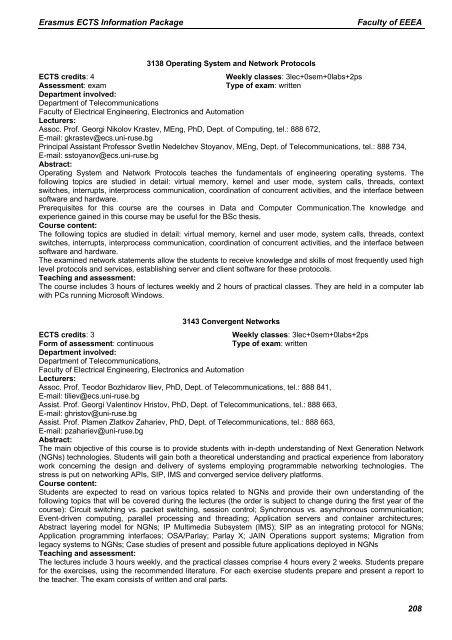Erasmus ECTS Information Package
Erasmus ECTS Information Package
Erasmus ECTS Information Package
You also want an ePaper? Increase the reach of your titles
YUMPU automatically turns print PDFs into web optimized ePapers that Google loves.
<strong>Erasmus</strong> <strong>ECTS</strong> <strong>Information</strong> <strong>Package</strong><br />
Faculty of EEEA<br />
3138 Operating System and Network Protocols<br />
<strong>ECTS</strong> credits: 4<br />
Weekly classes: 3lec+0sem+0labs+2ps<br />
Assessment: exam<br />
Type of exam: written<br />
Department involved:<br />
Department of Telecommunications<br />
Faculty of Electrical Engineering, Electronics and Automation<br />
Lecturers:<br />
Assoc. Prof. Georgi Nikolov Krastev, MEng, PhD, Dept. of Computing, tel.: 888 672,<br />
Е-mail: gkrastev@ecs.uni-ruse.bg<br />
Principal Assistant Professor Svetlin Nedelchev Stoyanov, MEng, Dept. of Telecommunications, tel.: 888 734,<br />
E-mail: sstoyanov@ecs.uni-ruse.bg<br />
Abstract:<br />
Operating System and Network Protocols teaches the fundamentals of engineering operating systems. The<br />
following topics are studied in detail: virtual memory, kernel and user mode, system calls, threads, context<br />
switches, interrupts, interprocess communication, coordination of concurrent activities, and the interface between<br />
software and hardware.<br />
Prerequisites for this course are the courses in Data and Computer Communication.The knowledge and<br />
experience gained in this course may be useful for the BSc thesis.<br />
Course content:<br />
The following topics are studied in detail: virtual memory, kernel and user mode, system calls, threads, context<br />
switches, interrupts, interprocess communication, coordination of concurrent activities, and the interface between<br />
software and hardware.<br />
The examined network statements allow the students to receive knowledge and skills of most frequently used high<br />
level protocols and services, establishing server and client software for these protocols.<br />
Teaching and assessment:<br />
The course includes 3 hours of lectures weekly and 2 hours of practical classes. They are held in a computer lab<br />
with PCs running Microsoft Windows.<br />
3143 Convergent Networks<br />
<strong>ECTS</strong> credits: 3<br />
Weekly classes: 3lec+0sem+0labs+2ps<br />
Form of assessment: continuous<br />
Type of exam: written<br />
Department involved:<br />
Department of Telecommunications,<br />
Faculty of Electrical Engineering, Electronics and Automation<br />
Lecturers:<br />
Assoc. Prof. Teodor Bozhidarov Iliev, PhD, Dept. of Telecommunications, tel.: 888 841,<br />
E-mail: tiliev@ecs.uni-ruse.bg<br />
Assist. Prof. Georgi Valentinov Hristov, PhD, Dept. of Telecommunications, tel.: 888 663,<br />
E-mail: ghristov@uni-ruse.bg<br />
Assist. Prof. Plamen Zlatkov Zahariev, PhD, Dept. of Telecommunications, tel.: 888 663,<br />
E-mail: pzahariev@uni-ruse.bg<br />
Abstract:<br />
The main objective of this course is to provide students with in-depth understanding of Next Generation Network<br />
(NGNs) technologies. Students will gain both a theoretical understanding and practical experience from laboratory<br />
work concerning the design and delivery of systems employing programmable networking technologies. The<br />
stress is put on networking APIs, SIP, IMS and converged service delivery platforms.<br />
Course content:<br />
Students are expected to read on various topics related to NGNs and provide their own understanding of the<br />
following topics that will be covered during the lectures (the order is subject to change during the first year of the<br />
course): Circuit switching vs. packet switching, session control; Synchronous vs. asynchronous communication;<br />
Event-driven computing, parallel processing and threading; Application servers and container architectures;<br />
Abstract layering model for NGNs; IP Multimedia Subsystem (IMS); SIP as an integrating protocol for NGNs;<br />
Application programming interfaces; OSA/Parlay; Parlay X; JAIN Operations support systems; Migration from<br />
legacy systems to NGNs; Case studies of present and possible future applications deployed in NGNs<br />
Teaching and assessment:<br />
The lectures include 3 hours weekly, and the practical classes comprise 4 hours every 2 weeks. Students prepare<br />
for the exercises, using the recommended literature. For each exercise students prepare and present a report to<br />
the teacher. The exam consists of written and oral parts.<br />
208
















